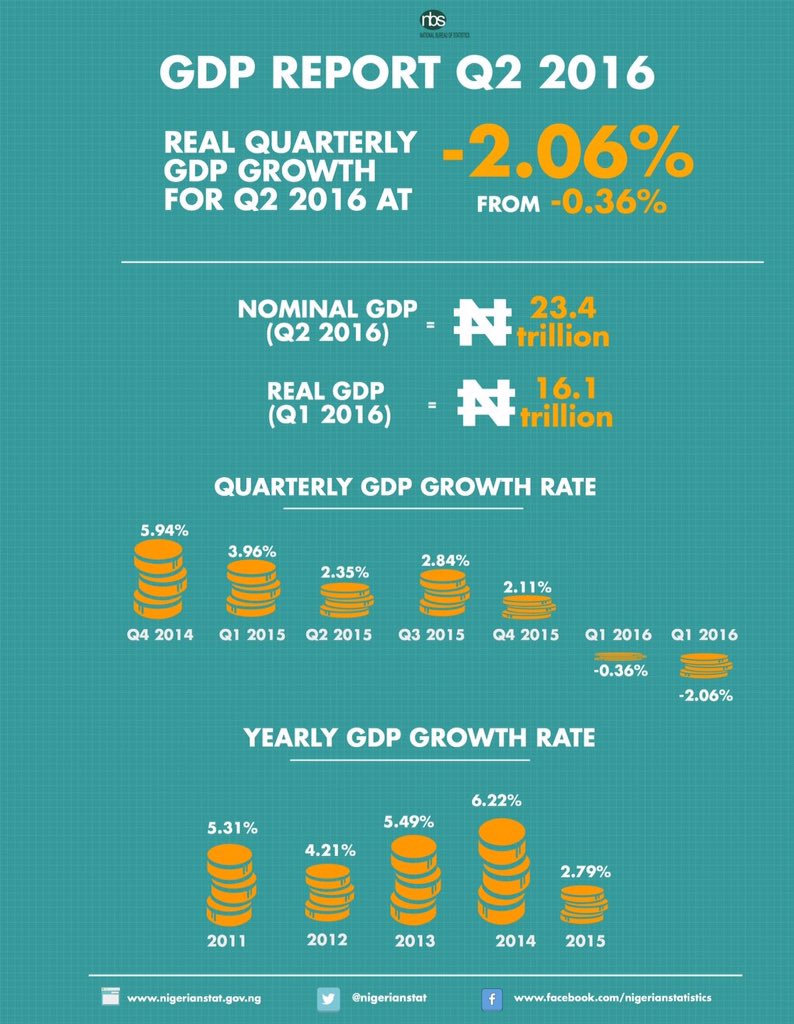Nigeria, Africa’s top crude producer officially slides into recession as its Gross Domestic Product (GDP) contracted by 2.06 percent in the second quarter, the statistics office said on Wednesday, but the government said the economy is expected to perform better in the second half of the year.
The Nigerian Bureau of Statistics (NBS) said the non-oil sector declined due to a weaker currency while lower oil prices dragged the oil sector down.
Output shrank by 0.36 in the first quarter.
Nigeria is in the midst of an economic crisis triggered by a slump in crude prices, its mainstay, which has hammered public finances and the naira and caused chronic dollar shortages. Crude sales accounts for around 70 percent of government revenues.The West African nation was last in a recession, for less than a year, in 1991, and experienced a prolonged one that started in 1982 and last until 1984, NBS data showed.
On Wednesday, the statistics office also said annual inflation rose to 17.1 percent in July from 16.5 percent in June, and food inflation rose to 15.8 percent from 15.3.
However, the country’s vice president said the government is hopeful that the economy will recover by the second half of the year.
"It is likely the second half will be better than the first half of 2016. This is because many of the challenges faced in the first half either no longer exist or have eased," Yemi Osinbajo said in a statement.
It said growth rates are likely to improve Indeed, as spending on projects yield results.
As oil-dependent Nigeria slides to recession for the first time in more than two decades, the effects of the downturn are being felt across the country — in local markets, factories, government offices and among informal traders.
In June, the International Monetary Fund sharply slashed its growth forecast for Africa’s largest economy, saying it would contract by 1.8 per cent this year, down from its estimate in April of 2.3 per cent growth for the year. The slowdown was triggered by tumbling crude prices and is heaping pressure on the government of Mr Buhari, who took office 15 months ago amid huge expectations following the first democratic transition of power to an opposition candidate in Nigeria’s history.
President Mohammadu Buhari has consistently urged citizens to be patient, but that message offers little comfort to most people.
Official unemployment increased 70 per cent in the first quarter of 2016 compared with the same period the previous year, reaching 12.1 per cent.
At the same time, prices of food and other goods are soaring, with annual inflation rose to 17.1 percent in July from 16.5 percent in June.
“The difficulty is that income has dropped,” says Abdullahi, 25, who manages his family’s perfume shop in Daura. “People have less spending money. Their concern is getting food, and prices are rising.”
Nigeria is in the midst of an economic crisis triggered by a slump in crude prices, its mainstay, which has hammered public finances and the naira and caused chronic dollar shortages. Crude sales accounts for around 70 percent of government revenues.The West African nation was last in a recession, for less than a year, in 1991, and experienced a prolonged one that started in 1982 and last until 1984, NBS data showed.
On Wednesday, the statistics office also said annual inflation rose to 17.1 percent in July from 16.5 percent in June, and food inflation rose to 15.8 percent from 15.3.
However, the country’s vice president said the government is hopeful that the economy will recover by the second half of the year.
"It is likely the second half will be better than the first half of 2016. This is because many of the challenges faced in the first half either no longer exist or have eased," Yemi Osinbajo said in a statement.
It said growth rates are likely to improve Indeed, as spending on projects yield results.
As oil-dependent Nigeria slides to recession for the first time in more than two decades, the effects of the downturn are being felt across the country — in local markets, factories, government offices and among informal traders.
In June, the International Monetary Fund sharply slashed its growth forecast for Africa’s largest economy, saying it would contract by 1.8 per cent this year, down from its estimate in April of 2.3 per cent growth for the year. The slowdown was triggered by tumbling crude prices and is heaping pressure on the government of Mr Buhari, who took office 15 months ago amid huge expectations following the first democratic transition of power to an opposition candidate in Nigeria’s history.
President Mohammadu Buhari has consistently urged citizens to be patient, but that message offers little comfort to most people.
Official unemployment increased 70 per cent in the first quarter of 2016 compared with the same period the previous year, reaching 12.1 per cent.
At the same time, prices of food and other goods are soaring, with annual inflation rose to 17.1 percent in July from 16.5 percent in June.
“The difficulty is that income has dropped,” says Abdullahi, 25, who manages his family’s perfume shop in Daura. “People have less spending money. Their concern is getting food, and prices are rising.”










0 comments:
Post a Comment